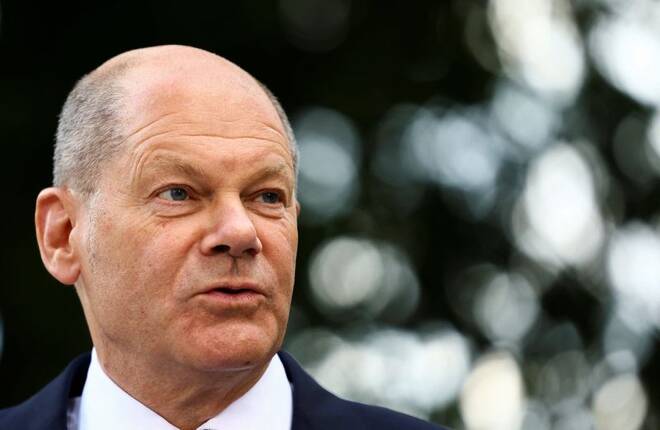Advertisement
Advertisement
Germany’s Scholz revives 1960s-style meets with unions, bosses on inflation
By:
BERLIN (Reuters) - German Chancellor Olaf Scholz met trade union and employers association leaders on Monday for the first of a series of meetings aimed at tackling what he called a "historic" cost of living crisis caused by spiraling energy prices.
BERLIN (Reuters) – German Chancellor Olaf Scholz met trade union and employers association leaders on Monday for the first of a series of meetings aimed at tackling what he called a “historic” cost of living crisis caused by spiraling energy prices.
Like governments across Europe, Berlin is under pressure to deal with soaring prices in the wake of Russia’s invasion of Ukraine and to balance the need to meet workers’ demands for payrises without causing inflation to spiral even further.
With the meetings at the chancellery, Scholz said he was reviving the “concerted action” that was established in 1967 when Germany fell into recession for the first time since its post-war boom.
“We must brace ourselves for the fact this situation will not change in the foreseeable future, in other words: we stand before a historic challenge,” Scholz told reporters after the meeting at the chancellery.
“We will only get through this crisis, as a country, when we agree together on solutions.”
This “concerted action” reflects the quest for consensus that characterizes labor relations in Germany, where wage deals are typically agreed in talks between employers’ associations and unions covering an industrial sector.
Scholz said the “social partners” agreed a common understanding of the situation at Monday’s meeting and would meet again in the coming weeks to design tools to deal with the cost of living crisis.
Consumer prices, harmonized to make them comparable with inflation data from other European Union countries (HICP), increased by 8.2% on the year, according to data released last week. Energy prices were 38% higher.
Scholz’s government, which took office in December, has already passed two multibillion-euro relief packages to help households and companies better shoulder the rising costs.
In an interview with German television on Sunday, Scholz said it was time to evaluate the impact of those packages before announcing a new one. He also said however he was “very worried” about the potentially socially explosive nature of inflation.
(Reporting by Sarah Marsh and Paul Carrel; Additional Reporting by Matthias Williams, Editing by William Maclean)
About the Author
Reuterscontributor
Reuters, the news and media division of Thomson Reuters, is the world’s largest international multimedia news provider reaching more than one billion people every day. Reuters provides trusted business, financial, national, and international news to professionals via Thomson Reuters desktops, the world's media organizations, and directly to consumers at Reuters.com and via Reuters TV. Learn more about Thomson Reuters products:
Did you find this article useful?
Latest news and analysis
Advertisement
